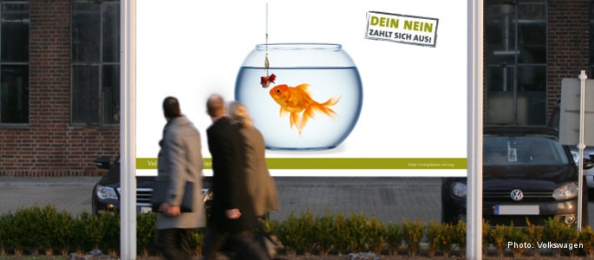Communicating Integrity
Internal and external communication features prominently in risk management and compliance activities at Volkswagen – the company is convinced that communication is just as essential for the successful implementation of the code of conduct and anti-corruption rules as it is for corporate success in general.
The Volkswagen Group has set its sights on becoming the economic and ecological leader among automobile manufacturers by 2018. To achieve that, the company must harness opportunities to increase efficiency and grow further as they present themselves along the way, but at the same time also manage numerous risks. For Volkswagen, sustainable success depends to a large extent on a responsible and forward-looking approach to leveraging its own potential, while at the same time handling possible risks. As far as the latter are concerned, attention is focused in particular on the violation of rules, such as incidents of corruption or the infringement of human rights, environmental protection laws, or labor rights. To protect these values and respond effectively to these risks, the Volkswagen Group pursues a
holistic, integrative Governance, Risk & Compliance (GRC) approach. This approach combines the risk-management system, the internal control system, and the compliance management system, thus covering possible areas of risk in a systematic and comprehensive manner. The objective is not only to identify possible risks at an early stage, but also to initiate adequate measures to exclude any damage to third parties or to the Group.
Compliance plays a special role in this context. At Volkswagen, the term “compliance” is understood to mean that all employees act in accordance with rules. Consequently, the most effective way to prevent compliance risks is for values to be internalized and to become second nature for employees. The company
aims to create an awareness of compliance issues and to encourage values such as fairness, integrity, and honesty. This is achieved through communication with employees – for example, by strengthening the role-model function of management.
Integrity must therefore be communicated both internally and externally – using different channels, senders, and forms. The “tone from the top,” for example, is of elementary importance. Employees will not treat the issue with the attention it requires if the company’s leadership does not regularly send a clear message about acting according to rules and behaving with integrity. And at the same time, the workforce must understand exactly what Volkswagen means when it calls on its employees to observe the code of conduct drawn up by the company. Protecting the Group brands, their good reputation, and thus their past and present success is a central task of compliance communication. Volkswagen Group employees have reason to be proud of their part in this success and of the Group’s popular brands.
To highlight the interaction between high-value products, sustainable corporate success, and behaving with integrity on the part of every individual employee, Volkswagen launched an awareness campaign in 2012 featuring a well-known German actor, who took a humorous, slightly tongue-in-cheek look at compliance. This relaxed and informal style came across well: Instead of fueling fears and spreading uncertainty, the campaign not only brought a smile to employees’ faces, but also gave them food for thought. And it fulfilled its mission in all respects by encouraging employees to find out more.
Volkswagen sets great store by ease of comprehension and a target-group focus in its compliance communication. Concrete examples and an intensive interactive dialog are used to present the issue in publications, training sessions, and the compliance app for smartphones – always easy to understand and transparent, and always expressed in simple language. “Simpleshows” on various compliance topics are currently being produced. These animated short films consist of mini-clips presented in the form of amusing illustrations to explain complex content in clear, everyday language.
Further facets of compliance communication at Volkswagen include close communication with the governing bodies, the Group-wide compliance organization, and the public.
Communication with – and information for – the executive management and the governing bodies is vitally important, since both have clearly defined legal obligations. They are furnished on a regular basis with everything that is required to gain an overview of the risk situation of the Group – including compliance risks. A regularly issued report documents the status and activities of the integrated GRC organization.

Both traditional and innovative communication channels are used to maintain an effective network for the members of the GRC organization and their issues within a large group such as Volkswagen and to foster exchange, for example among the brands, with a view to establishing a common understanding of risk. An internal award for particularly successful GRC measures will be presented for the first time this year. The invitation to participate in the competition for this award triggered friendly rivalry among colleagues, especially in the 12 brands belonging to the Volkswagen Group. The best ideas will be communicated throughout the Group and reviewed for their application potential in a Group context.
Volkswagen also communicates with third parties on GRC topics: Detailed information on measures, activities, and the organization can be found on the internet as well as in the Sustainability Report and the Annual Report published by Volkswagen AG.
Integrity in all relations between the Volkswagen Group and its stakeholders lies at the heart of a corporate culture that is characterized by a pronounced awareness of the interaction between commercial success, sustainable development, and the observation of core values. In this process, communication in the form of information and dialog is the key to success. The goal of all GRC communication activities must be to convince employees and managers that acting in accordance with rules and developing a risk-aware mindset bring benefits for every individual and for the company as a whole – and to encourage them to play a proactive role.
Moreover, the public respects a company that sets itself apart from the rest through compliant behavior, and interprets such conduct as an element of fair competition.
The company can only attain its stated goals by practicing comprehensive risk management that factors in communicative aspects at every stage. To achieve that, communication is a common thread that weaves its way through the work of the GRC organization in the Volkswagen Group. That is as it should be, because if compliance and risk issues were to be viewed solely in terms of legal or mathematical logic, one key, success-critical aspect would be missing – namely how to anchor the principles in the corporate culture and thereby translate them into day-to-day interaction.
| Initiator | Volkswagen |
| Project start | - |
| Status | ongoing |
| Region | Worlwide |
| Contact person | Thomas Steg, Frank Fabian |
| Awards | - |
| Anti-Corruption | X |
| Business & Peace | - |
| Development | - |
| Environment | - |
| Financial Markets | - |
| Implementing UNGC Principles in your Corporate CSR Management | - |
| Human Rights | - |
| Labour Standards | - |
| Local Networks | - |
| Advocacy of global issues | X |
| Business opportunities in low income communities/countries | - |
| Project funding | - |
| Provision of goods | - |
| Provision of services/personal | - |
| Standards and guidelines development | X |
The Volkswagen Group with its headquarters in Wolfsburg is one of the world’s leading automobile manufacturers and the largest carmaker in Europe. In 2011, the Group increased the number of vehicles delivered to customers to 8.265 million, corresponding to a 12.3 percent share of the world passenger car market. The Group is made up of ten brands from seven European countries: Volkswagen, Audi, SEAT, ŠKODA, Bentley, Bugatti, Lamborghini, Volkswagen Commercial Vehicles, Scania and MAN.
Each brand has its own character and operates as an independent entity on the market. The product spectrum extends from low-consumption small cars to luxury class vehicles. In the commercial vehicle sector, the product offering ranges from pick-ups to buses and heavy trucks.
The Volkswagen Group is also active in other fields of business, manufacturing large-bore diesel engines for marine and stationary applications (turnkey power plants), turbochargers, turbomachinery (steam and gas turbines), compressors and chemical reactors, and also producing vehicle transmissions, special gear units for wind turbines, slide bearings and couplings as well as testing systems for the mobility sector.
Frank Fabian works for Volkswagen
Thomas Steg works for Volkswagen.
Write a comment about this page
Your comments are provided by your own free will and you take sole responsibility for any direct or indirect liability. In order to maintain the highest discussion quality, all comments will be reviewed by our editors. You hereby provide us with an irrevocable, unlimited, and global license for no consideration to use, reuse, delete or publish comments in accordance with our Community Guidelines.
0 Comments
About Us // Privacy Policy // Copyright Information // Legal Disclaimer // Contact
Copyright © 2012-2018 macondo publishing GmbH. All rights reserved.
The CSR Academy is an independent learning platform of the macondo publishing group.









